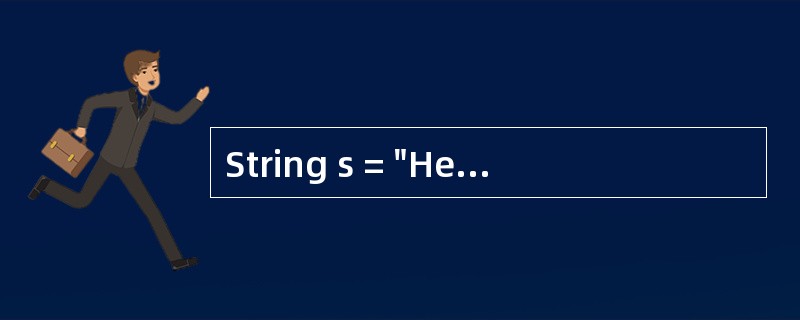String s = "Hello";s = s + " world!";这两行代码执行后,
原始的String 对象中的内容到底变了没有?
参考答案与解析:
-
相关试题
-
String s = "Hello";s = s £« " world!";这两
-
[试题]String s = "Hello";s = s + " world!";这两行代码执行后,原始的String 对象中的内容到底变了没有?
- 查看答案
-
假设有以下代码:String s="hello";String t="hello
-
[单选题]假设有以下代码: String s="hello"; String t="hello"; char c[ ]={'h','e','l','l','o'}; 下列选项中,返回false的语句是______。A.s.equals(t);B.t.equals(c);C.s==t;D.t.equals(new String("hello"));
- 查看答案
-
给出下列的代码,则以下()选项返回true。String s="hello";S
-
[单选题]给出下列的代码,则以下( )选项返回true。 String s="hello"; String t="hello": char c[]={'h','e','l','l','o',};A.s.equals(t);B.t.equals(c);C.s==t;D.t==c;
- 查看答案
-
给出下列的代码,则以下哪个选项返回true?String s="hello";S
-
[单选题]给出下列的代码,则以下哪个选项返回true? String s="hello"; String t="hello"; char c []= {'h','e','1','1','o'};A)s.equals(t);A.t. equals(B.;C.s==t;D.t==c;
- 查看答案
-
下面这段代码会产生( )个String对象。Strings1="hello";S
-
[单选题]下面这段代码会产生( )个String对象。Strings1="hello";Strings2=s1.substring(2,3);Strings3=s1.toString();Strings4=newStringBuffer(s1).toString();A.1B.2C.3D.4
- 查看答案
-
给出下面的代码,则以下( )选项返回true。String s="hello";
-
[单选题]给出下面的代码,则以下( )选项返回true。 String s="hello"; String t="hello"; Char c[]={'h','e','l','l','o'};A.s. equals (t) ;B.t. equals (C);C.s==t;D.t==c;
- 查看答案
-
char *p="hello"; printf("%s",p); p£«£«;
-
[主观题]char *p="hello";printf("%s",p);p++;printf("%s",p);printf("%c",*p);
- 查看答案
-
变量s的定义为“char *s="Hello world!";”,要使变量p指向
-
[单选题]变量s的定义为“char *s="Hello world!";”,要使变量p指向s所指向的同一个字符串,则应选取(47)。A.char *p=s;B.char *p=&s;C.char *p;p=*s;D.char *p; p=&s;
- 查看答案
-
设有定义:char s[12]={"hello"},则cout<<strlen(
-
[单选题]设有定义:char s[12]={"hello"},则cout<<strlen(s)的输出是 ______。A.5B.6C.11D.12
- 查看答案
-
已知有如下语句:s="hello, world"r=Mid(s,7,5)运行上面
-
[单选题]已知有如下语句: s="hello, world" r=Mid(s,7,5) 运行上面的语句后,变量r的值为 ( )A.helloB.wotldC.llo,wD.orld
- 查看答案
